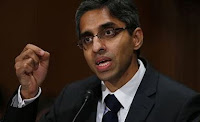Alex Schadenberg
Executive Director, Euthanasia Prevention Coalition
The US Surgeon General, Vivek Murthy, released an 82 page report yesterday on loneliness and stated that half of Americans have experienced loneliness. He said that Americans are so lonely that those consequences constitute a near national health emergency.
In an interview with Amanda Seitz from the Associated Press, Murthy stated:
“We now know that loneliness is a common feeling that many people experience. It’s like hunger or thirst. It’s a feeling the body sends us when something we need for survival is missing,” Murthy told The Associated Press in an interview. “Millions of people in America are struggling in the shadows, and that’s not right. That’s why I issued this advisory to pull back the curtain on a struggle that too many people are experiencing.”
Seitz reported that:
The loneliness epidemic is hitting young people, ages 15 to 24, especially hard. The age group reported a 70% drop in time spent with friends during the same period.
Loneliness increases the risk of premature death by nearly 30%, with the report revealing that those with poor social relationships also had a greater risk of stroke and heart disease. Isolation also elevates a person’s likelihood for experiencing depression, anxiety and dementia, according to the research. Murthy did not provide any data that illustrates how many people die directly from loneliness or isolation.
Murthy told the Associated Press that the loneliness crisis worsened during the Covid-19 crisis with people spending on average only 20 minutes per day communicating with friends and relatives. Seitz reported that:
Technology has rapidly exacerbated the loneliness problem, with one study cited in the report finding that people who used social media for two hours or more daily were more than twice as likely to report feeling socially isolated than those who were on such apps for less than 30 minutes a day.
Murthy said social media is driving the increase in loneliness in particular. His report suggests that technology companies roll out protections for children especially around their social media behavior.
“There’s really no substitute for in-person interaction,” Murthy said. “As we shifted to use technology more and more for our communication, we lost out on a lot of that in-person interaction. How do we design technology that strengthens our relationships as opposed to weaken them?”
The Euthanasia Prevention Coalition is also concerned with the link between loneliness, depression and assisted suicide.
An Irish longitudinal study examined the wish to die (WTD) among 8174 patients who were over the age of 50. The study that was published in February 2021 followed participants for 6 years and found that people who had a (WTD), almost three-quarters reported being lonely and 60% had clinically significant depressive symptoms.
Sadly many people who die by assisted suicide are experiencing a wish to die which is closely associated with loneliness and depression. Most of those who experience depressive symptoms are not being treated for their condition.

1 comment:
Loneliness is a significant factor in people feeling assisted suicide or euthanasia is a good choice and a risk factor for them to be bullied, coerced or cajoled into it:
A 2014 study of assisted suicides in Switzerland found that there was a “higher rate among people living alone and the divorced”. Study leader, Professor Matthias Egger, commented that “Social isolation and loneliness are well known risk factors for non-assisted suicides and our results suggest that they may also play a role in assisted suicide.”
The Belgian Euthanasia Evaluation and Control Commission describes “polypathology” as including situations where mobility difficulties, increasing deafness or loss of vision have led to loneliness, social isolation or a decreased ability to engage in various activities as sufficient justification for euthanasia.
In the Netherlands, In nearly half the cases where the Levenseindekliniek (End of Life Clinic) granted a request for euthanasia in its first year of operation (1 Mar 2012 to 1 Mar 2013) loneliness was listed as a type of unbearable suffering in nearly half (49.1%) the cases.
The annual report for Quebec for April 2021-March 2022, stated that 1700 (47%) of people euthanased gave a reason as “Perceived burden on family, friends or caregivers” and 824 (23%) of people reported “isolation or loneliness” as a reason. (All documented at: https://www.australiancarealliance.org.au/flawed_experiments )
A recent Australian report on elder abuse found a correlation between all abuse subtypes and low social support (including social isolation and loneliness). A low sense of social support is the highest risk factor for physical abuse (30.4%) and the second highest risk factor for financial abuse (29.8%). (Qu, L. et al. National Elder Abuse Prevalence Study: Final Report, Dec 2021, https://aifs.gov.au/publications/national-elder-abuse-prevalence-study-final-report )
Post a Comment